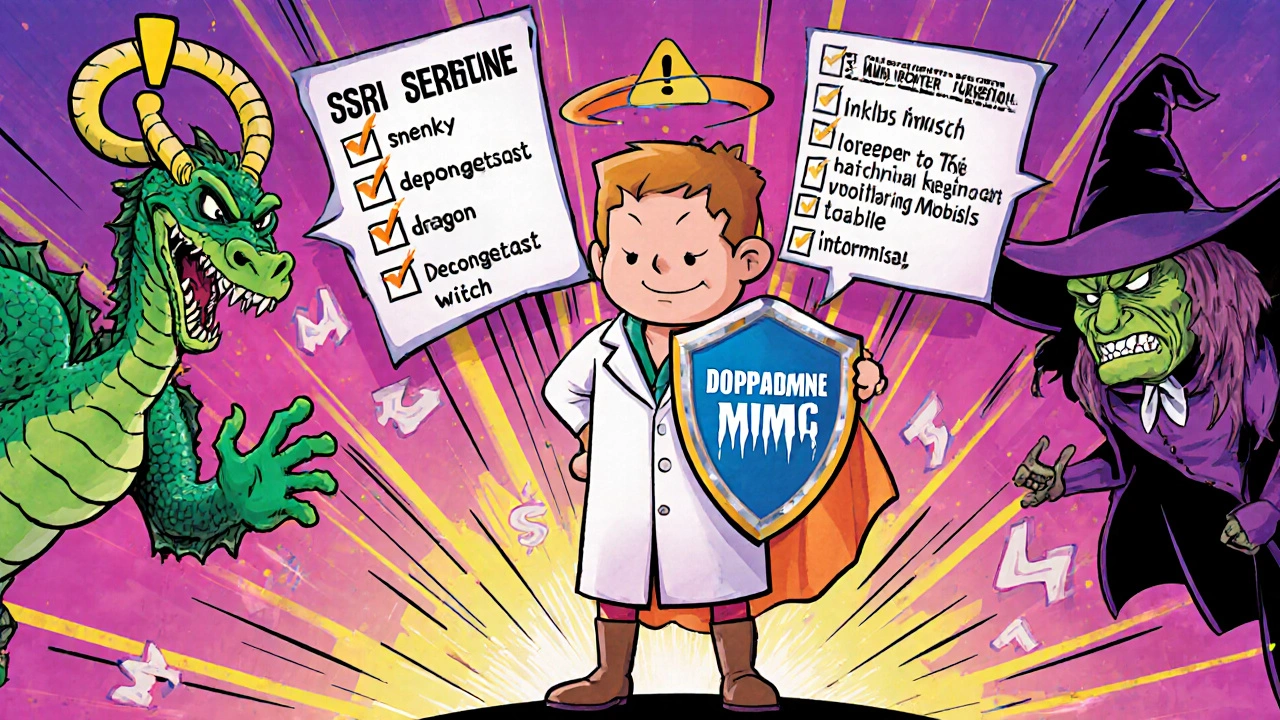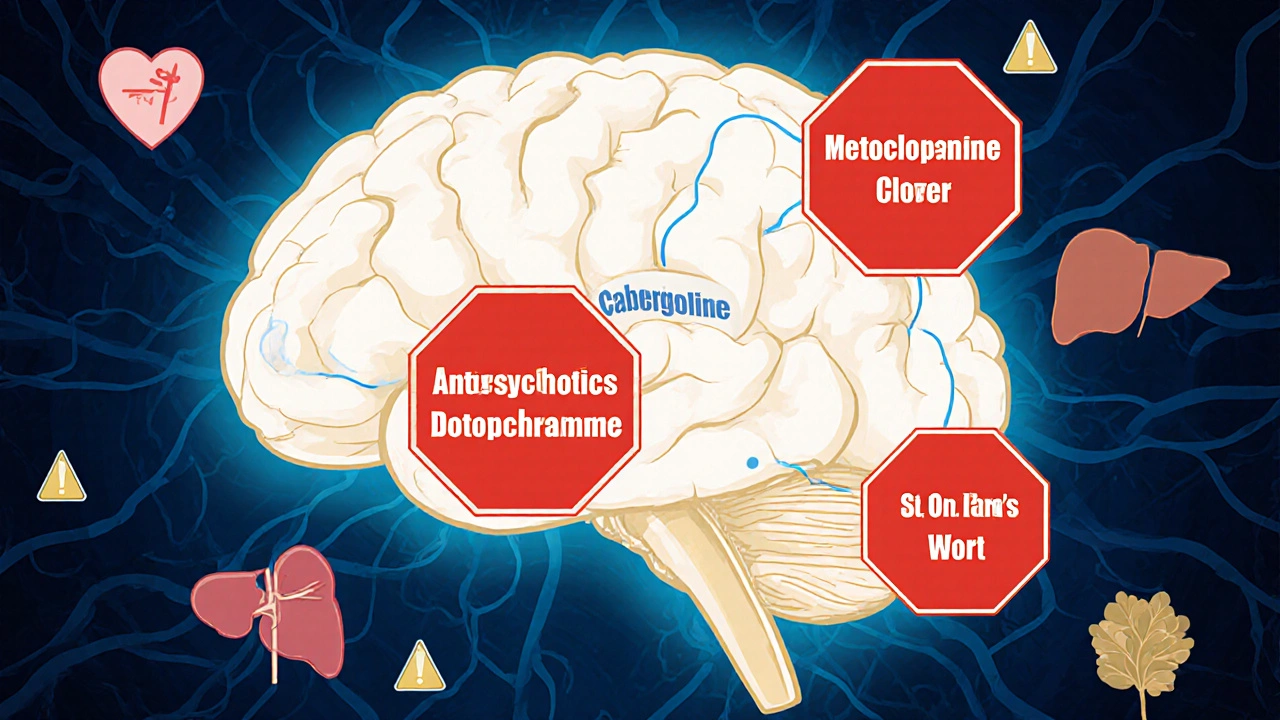Cabergoline is a dopamine agonist used to treat high prolactin levels, Parkinson’s disease, and sometimes off-label for restless legs syndrome. But what most people don’t realize is that this medication doesn’t play nice with everything else in your system. Even small changes in what you take-whether it’s a prescription, an over-the-counter pill, or a supplement-can turn cabergoline from helpful to harmful.
How Cabergoline Works (Simply)
Cabergoline mimics dopamine, a chemical in your brain that controls movement, mood, and hormone release. By binding to dopamine receptors, it tells your pituitary gland to stop making prolactin. That’s why it’s prescribed for conditions like prolactinomas (benign tumors that overproduce prolactin) or infertility linked to high prolactin. But dopamine doesn’t just live in one part of the brain. It’s everywhere. So when you take cabergoline, you’re affecting your heart, your blood vessels, your stomach, and even your mood.
Medications That Can Clash With Cabergoline
Some drugs cancel out cabergoline’s effects. Others make them too strong. Either way, the result can be dangerous.
- Antipsychotics like haloperidol, risperidone, and olanzapine block dopamine receptors. If you’re taking these for schizophrenia or bipolar disorder, they directly fight cabergoline. You might end up with no benefit from cabergoline, or worse-worsened symptoms like tremors or muscle stiffness.
- Metoclopramide (used for nausea and GERD) also blocks dopamine. Taking it with cabergoline can make both drugs less effective. This combo can leave you with uncontrolled nausea or a spike in prolactin.
- Other dopamine antagonists like prochlorperazine (Compazine) and promethazine (Phenergan) have the same issue. Even allergy meds containing promethazine can interfere.
- Selective serotonin reuptake inhibitors (SSRIs) like fluoxetine or sertraline don’t directly interact, but they can raise the risk of serotonin syndrome if combined with cabergoline in rare cases. Watch for confusion, rapid heartbeat, high fever, or muscle rigidity.
Blood Pressure Risks: The Silent Danger
Cabergoline can lower blood pressure. That’s normal. But if you’re already on blood pressure meds-like lisinopril, amlodipine, or metoprolol-you could drop too low. Symptoms? Dizziness, fainting, blurred vision, or falls. This isn’t just uncomfortable-it’s risky for older adults or those with heart conditions.
Worse, some people take over-the-counter decongestants like pseudoephedrine (Sudafed) or phenylephrine. These raise blood pressure. If you take them while on cabergoline, your body gets mixed signals. One drug tries to lower pressure, the other forces it up. This rollercoaster can stress your heart and arteries. Avoid these cold meds unless your doctor says it’s safe.
Herbs, Supplements, and Natural Products
People think "natural" means safe. That’s not true with cabergoline.
- St. John’s Wort speeds up how your liver breaks down drugs. It can make cabergoline less effective, causing prolactin to rise again.
- Yohimbine (often sold as an energy or libido booster) increases dopamine and norepinephrine. Combined with cabergoline, it can cause anxiety, high blood pressure, or rapid heartbeat.
- Iron supplements can reduce how well your body absorbs cabergoline. If you’re taking iron for anemia, take it at least 2 hours before or after cabergoline.
- High-dose vitamin B6 may lower prolactin on its own. If you’re taking it with cabergoline, your doctor might misread your blood tests and think the drug isn’t working-leading to an unnecessary dose increase.

Alcohol and Cabergoline: A Bad Mix
Alcohol doesn’t just make you sleepy-it lowers blood pressure and slows your central nervous system. Cabergoline does the same. Together, they can cause extreme dizziness, fainting, or even loss of consciousness. If you drink regularly, talk to your doctor about cutting back. Even one glass of wine with your pill could be too much.
What About Food?
There’s no strong evidence that food directly interferes with cabergoline absorption. But taking it with a heavy, high-fat meal can slow down how fast it enters your bloodstream. That might delay its effect. For consistent results, take cabergoline on an empty stomach-usually at least 30 minutes before eating. If nausea is a problem, your doctor might suggest taking it with a light snack, like toast or crackers.
When to Call Your Doctor Immediately
Some interactions aren’t just inconvenient-they’re emergencies.
- Sudden chest pain or irregular heartbeat
- Severe dizziness or fainting
- Difficulty breathing
- Swelling in your legs or feet (sign of heart strain)
- Hallucinations, confusion, or extreme agitation
- Unexplained fever, sweating, or stiff muscles (possible serotonin syndrome)
If you notice any of these after starting a new medication or supplement, stop taking it and call your doctor right away. Don’t wait. Don’t Google it. Call.

How to Stay Safe: A Simple Checklist
Here’s what you can do today to avoid dangerous interactions:
- Make a full list of everything you take: prescriptions, OTC meds, vitamins, herbs, even CBD or melatonin.
- Bring that list to every doctor’s visit-even your dentist or dermatologist.
- Ask your pharmacist: "Does this new pill or supplement interact with cabergoline?" Don’t assume they know.
- Use one pharmacy for all your prescriptions. They track interactions better than multiple stores.
- Never start a new supplement without checking with your prescriber-even if it’s "natural."
- Set phone reminders to take cabergoline at the same time each day, ideally on an empty stomach.
What If You’ve Already Had a Bad Reaction?
If you took something with cabergoline and felt off-dizzy, nauseous, heart racing-don’t panic. But do act.
Write down:
- What you took
- When you took it
- How you felt (and when symptoms started)
- How long it lasted
Then call your doctor or pharmacist. Even if symptoms faded, this info helps them adjust your plan. You might need to stop one drug, switch to another, or space doses further apart.
Bottom Line: Cabergoline Is Powerful-But Not Alone
Cabergoline works well when used correctly. But it’s not a standalone fix. It’s part of a bigger picture that includes your other meds, your diet, your lifestyle, and your body’s unique chemistry. The more you know about what it interacts with, the safer you’ll be.
Don’t guess. Don’t assume. Always check. Your health depends on it.
Can I take cabergoline with birth control pills?
Yes, cabergoline doesn’t interfere with hormonal birth control. But high prolactin can affect ovulation and menstrual cycles. If you’re taking cabergoline to restore fertility or regular periods, your doctor will monitor your hormone levels. Birth control won’t hide whether the drug is working. Always tell your provider you’re on both.
Does cabergoline interact with thyroid medication?
No direct interaction exists between cabergoline and levothyroxine. But both can affect your metabolism and heart rate. If you’re on thyroid meds, your doctor may check your heart rhythm or TSH levels more often, especially when starting cabergoline. Take them at different times-thyroid med in the morning on an empty stomach, cabergoline later in the day.
Can cabergoline cause heart valve problems?
High doses of cabergoline (over 2 mg per week) have been linked to rare cases of heart valve thickening, especially in people with a history of heart disease. This risk is very low at standard doses (0.5-1 mg per week). Your doctor will likely order an echocardiogram if you’ve been on cabergoline for more than a year, especially if you have risk factors like high blood pressure or smoking.
Is it safe to take cabergoline with antidepressants?
Many people take cabergoline with SSRIs or SNRIs without issue. But there’s a small risk of serotonin syndrome-especially with drugs like fluoxetine, venlafaxine, or trazodone. Symptoms include agitation, sweating, fast heartbeat, and muscle twitching. If you’re on both, watch for these signs in the first few weeks. Your doctor may start you on a low dose of cabergoline to reduce risk.
What happens if I miss a dose of cabergoline?
If you miss a dose, take it as soon as you remember-if it’s within a few hours. If it’s almost time for your next dose, skip the missed one. Don’t double up. Missing one dose won’t undo your progress, but skipping regularly can cause prolactin to rise again. If you miss doses often, talk to your doctor about setting reminders or switching to a once-weekly schedule.


Ryan Tanner
November 1, 2025 AT 21:18Just started cabergoline last month for prolactin issues and holy crap, this post saved my life. 🙌 I was taking Sudafed for a cold and felt like I was gonna pass out in the shower. Now I keep a list of everything I take on my phone. Pro tip: set a reminder to take it on an empty stomach - my nausea dropped by 80%. You’re not alone, folks.
Jessica Adelle
November 3, 2025 AT 16:29It is entirely unacceptable that individuals are permitted to self-administer potent pharmaceuticals without rigorous oversight. The proliferation of casual supplement use among the general populace is a direct consequence of societal moral decay. Cabergoline is not a dietary enhancer; it is a controlled substance, and its misuse reflects a profound disregard for medical authority and scientific discipline.
Emily Barfield
November 4, 2025 AT 04:36Oh my god… dopamine… it’s everywhere… it’s not just a neurotransmitter… it’s the ghost in the machine… the silent conductor of our moods, our movements, our very sense of self… and we just pop a pill and expect it to behave?? We’re playing God with chemistry we barely understand… and then we wonder why we feel… empty??
Sai Ahmed
November 5, 2025 AT 16:38They don’t tell you this, but cabergoline is just a gateway. Next thing you know, they’re putting microchips in your pills to track your hormone levels. The FDA, Big Pharma, and the WHO are all in bed together. They want you dependent. Don’t trust any doctor who says it’s safe. I stopped mine after reading a 2003 Belgian study that was buried.
Albert Schueller
November 6, 2025 AT 04:48St. Johns wort? Are you kidding me? People think herbal crap is safe? This is why america is falling apart. I took cabergoline for 6 months and never touched anything but water and my prescribed meds. If you’re taking ‘natural’ supplements, you’re just gambling with your brain. And yes, I know what I’m talking about - I read the FDA’s 2017 warning on page 12.
Ted Carr
November 7, 2025 AT 20:00So let me get this straight. You’re telling me the only way to survive modern medicine is to become a full-time pharmacist, keep a spreadsheet of every pill you’ve ever swallowed, and never laugh at a joke again because alcohol might lower your BP? Brilliant. I’ll just stop taking the pill and go live in a cave. At least then I’ll know what’s poisoning me.
Rebecca Parkos
November 9, 2025 AT 14:43THIS. THIS IS WHY WE NEED TO TALK ABOUT MEDICATIONS. I had a friend who took promethazine with cabergoline and ended up in the ER with muscle rigidity. She didn’t even know they could interact. If you’re reading this and you’re on cabergoline - drop everything. Go to your pharmacy. Ask them. Now. Don’t wait until you’re dizzy on the floor. I’m serious. I’m crying typing this.
Bradley Mulliner
November 11, 2025 AT 00:58The real issue here is not the drug interactions - it’s the fact that patients are allowed to make decisions about their own treatment. This post reads like a guide for the intellectually lazy. If you can’t follow basic pharmacological principles, you shouldn’t be taking anything stronger than aspirin. The system is broken because people refuse to accept responsibility.
Rahul hossain
November 12, 2025 AT 05:55Alcohol? Pfft. In my village, we mix everything - chai, turmeric, and even a drop of desi liquor with our pills. If your body can’t handle it, maybe your body was never meant to survive modernity. Cabergoline? It’s just another tool. Use it wisely, or don’t use it at all. But don’t blame the medicine - blame the man who thinks he’s too cool for warnings.
Reginald Maarten
November 13, 2025 AT 04:44Correction: The post inaccurately implies that SSRIs pose a "rare" risk of serotonin syndrome with cabergoline. In fact, the FDA’s Adverse Event Reporting System (FAERS) recorded 47 cases between 2015 and 2022 involving cabergoline and serotonergic agents - 12 of which were classified as severe. The term "rare" is statistically misleading when the consequence is potentially fatal. Also, the recommendation to take cabergoline on an empty stomach is not universally supported - a 2020 pharmacokinetic study in healthy volunteers showed no significant difference in AUC between fasted and fed states (p=0.18). Context matters.
Tamara Kayali Browne
November 14, 2025 AT 17:45While the information presented is largely accurate, the structure lacks clinical precision. The section on iron supplements fails to reference the specific divalent cation transporters involved in cabergoline absorption (e.g., DMT1). Additionally, the recommendation to "avoid" decongestants is overly broad - phenylephrine has a shorter half-life than pseudoephedrine and may be tolerated in low, intermittent doses under monitoring. A more nuanced approach is warranted.
Nishigandha Kanurkar
November 16, 2025 AT 07:33They’re hiding the truth again… cabergoline was originally developed as a fertility drug for cattle… now they’re giving it to humans… and you think it’s safe? The same company that makes it also makes the vaccines… they’re testing how much dopamine manipulation the human body can take before it breaks… I saw the leaked memo… they’re waiting for the right moment to release the next phase… don’t take it… don’t trust anyone…